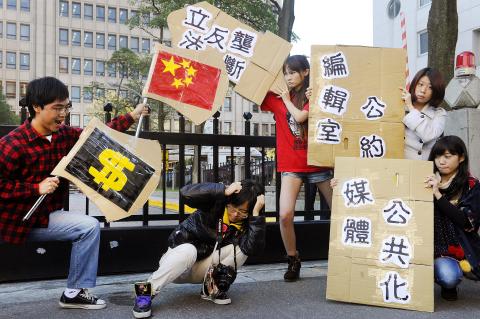The Fair Trade Commission yesterday said it had not received a buyout application for the Next Media Group (壹傳媒集團), nearly one month after the Hong Kong-based company confirmed plans to sell its Taiwanese operations for NT$17.5 billion (US$601.3 million).
Spokesman Sun Lih-chyun (孫立群) said the commission has the authority to intervene if the buyers of the group’s print and TV businesses in Taiwan were to proceed with the buyout without submitting an application and gaining approval from the commission.
While the commission cannot take any action now, “there is a four-month deadline for the buyout, so time is on our side,” Sun said at a press conference.

Photo: George Tsorng, Taipei Times
CHANGES?
Sun’s remark came two days after the Hong Kong company disclosed in a stock exchange filing that it would sell its Taiwanese print assets — Chinese-language Apple Daily (Taiwan) (台灣蘋果日報), Sharp Daily (台灣爽報) and Next Magazine (壹週刊) — for NT$16 billion and Next TV Broadcasting Ltd (壹電視) for NT$1.5 billion.
The filing said the completion of the deal would be conditional on the fulfillment of the buyout of Next Media’s print media subsidiaries, and if the sale agreement of Next Media’s print group is not fulfilled within four months, the prospective buyers have the right to cancel the deal.
According to the filing submitted to the Hong Kong Stock Exchange late on Wednesday, Formosa Plastics Group (FPG, 台塑集團) chairman William Wong (王文淵) will acquire 34 percent of Next Media’s print assets, followed by Want Want Times Group (旺旺中時集團) president Tsai Shao-chung (蔡紹中) with 32 percent, Chinatrust Charity Foundation (中信慈善基金會) chairman Jeffrey Koo Jr (辜仲諒) with 20 percent and Lung Yen Life Service Corp (龍巖集團) chairman David Lee (李世聰) with 14 percent.
The filing said that buyers of Next TV are Wong with a 34 percent share, Koo with 20 percent and Lee with 14 percent, while Taiwan Fire & Marine Insurance Co (台灣產物保險) chairman Steve Lee’s (李泰宏) son, Lee Jiang-cheng (李建成), will hold 32 percent.
TRANSPARENCY
In response to criticism that the commission has not been fully transparent with its review process, Sun said the commission could not disclose the information provided by the companies involved, adding that it would also not be suitable to make it clear to Next Media’s buyers how they could circumvent the government’s regulatory review.
Asked whether the commission would call a public hearing with the all prospective investors in the Next Media deal participating, Sun said it was an option that the commission would consider.
However, the commission would have to notify participants 30 days before the hearing, but it only has 60 days to review the case, Sun said. Moreover, a public hearing on the case would be nothing more than a means for the commission to gather opinions, he added.
As for whether Apple Daily and Next Magazine should be considered as two products targeting the same market, Sun said the preliminary conclusion is that they target two different markets.

To many, Tatu City on the outskirts of Nairobi looks like a success. The first city entirely built by a private company to be operational in east Africa, with about 25,000 people living and working there, it accounts for about two-thirds of all foreign investment in Kenya. Its low-tax status has attracted more than 100 businesses including Heineken, coffee brand Dormans, and the biggest call-center and cold-chain transport firms in the region. However, to some local politicians, Tatu City has looked more like a target for extortion. A parade of governors have demanded land worth millions of dollars in exchange

An Indonesian animated movie is smashing regional box office records and could be set for wider success as it prepares to open beyond the Southeast Asian archipelago’s silver screens. Jumbo — a film based on the adventures of main character, Don, a large orphaned Indonesian boy facing bullying at school — last month became the highest-grossing Southeast Asian animated film, raking in more than US$8 million. Released at the end of March to coincide with the Eid holidays after the Islamic fasting month of Ramadan, the movie has hit 8 million ticket sales, the third-highest in Indonesian cinema history, Film

Taiwan Semiconductor Manufacturing Co’s (TSMC, 台積電) revenue jumped 48 percent last month, underscoring how electronics firms scrambled to acquire essential components before global tariffs took effect. The main chipmaker for Apple Inc and Nvidia Corp reported monthly sales of NT$349.6 billion (US$11.6 billion). That compares with the average analysts’ estimate for a 38 percent rise in second-quarter revenue. US President Donald Trump’s trade war is prompting economists to retool GDP forecasts worldwide, casting doubt over the outlook for everything from iPhone demand to computing and datacenter construction. However, TSMC — a barometer for global tech spending given its central role in the

Alchip Technologies Ltd (世芯), an application-specific integrated circuit (ASIC) designer specializing in server chips, expects revenue to decline this year due to sagging demand for 5-nanometer artificial intelligence (AI) chips from a North America-based major customer, a company executive said yesterday. That would be the first contraction in revenue for Alchip as it has been enjoying strong revenue growth over the past few years, benefiting from cloud-service providers’ moves to reduce dependence on Nvidia Corp’s expensive AI chips by building their own AI accelerator by outsourcing chip design. The 5-nanometer chip was supposed to be a new growth engine as the lifecycle